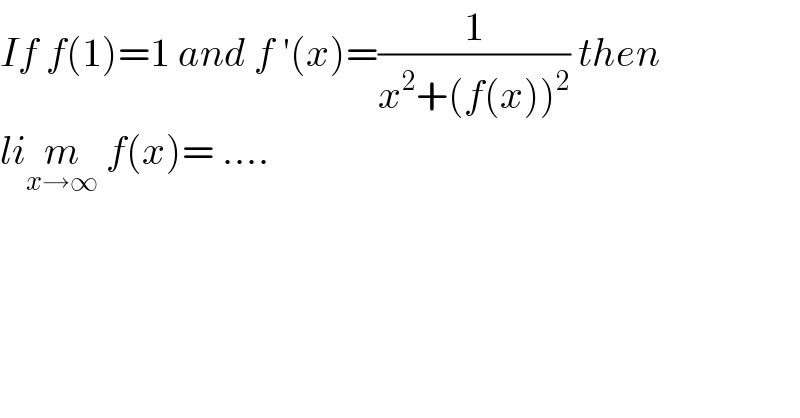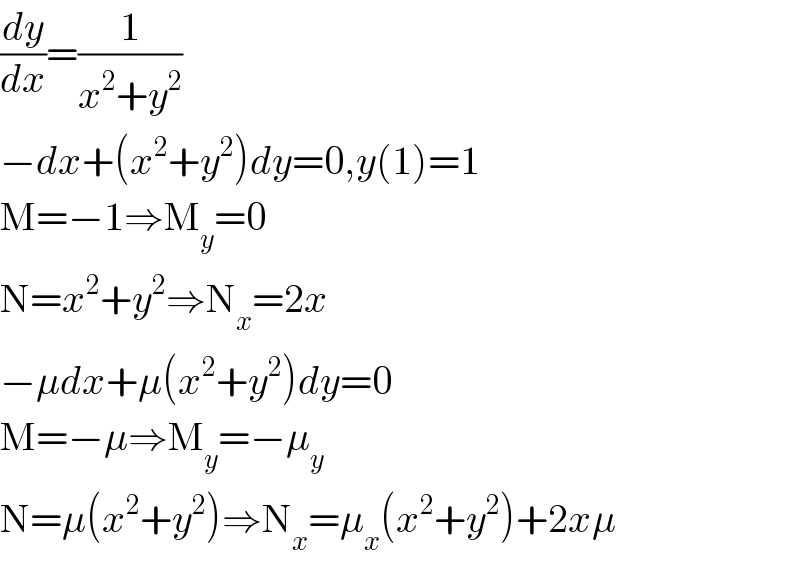
Question Number 264 by novrya last updated on 17/Dec/14

$${If}\:{f}\left(\mathrm{1}\right)=\mathrm{1}\:{and}\:{f}\:'\left({x}\right)=\frac{\mathrm{1}}{{x}^{\mathrm{2}} +\left({f}\left({x}\right)\right)^{\mathrm{2}} }\:{then}\: \\ $$$${li}\underset{{x}\rightarrow\infty} {{m}}\:{f}\left({x}\right)=\:.... \\ $$
Commented by 123456 last updated on 17/Dec/14

$$\frac{{dy}}{{dx}}=\frac{\mathrm{1}}{{x}^{\mathrm{2}} +{y}^{\mathrm{2}} } \\ $$$$−{dx}+\left({x}^{\mathrm{2}} +{y}^{\mathrm{2}} \right){dy}=\mathrm{0},{y}\left(\mathrm{1}\right)=\mathrm{1} \\ $$$$\mathrm{M}=−\mathrm{1}\Rightarrow\mathrm{M}_{{y}} =\mathrm{0} \\ $$$$\mathrm{N}={x}^{\mathrm{2}} +{y}^{\mathrm{2}} \Rightarrow\mathrm{N}_{{x}} =\mathrm{2}{x} \\ $$$$−\mu{dx}+\mu\left({x}^{\mathrm{2}} +{y}^{\mathrm{2}} \right){dy}=\mathrm{0} \\ $$$$\mathrm{M}=−\mu\Rightarrow\mathrm{M}_{{y}} =−\mu_{{y}} \\ $$$$\mathrm{N}=\mu\left({x}^{\mathrm{2}} +{y}^{\mathrm{2}} \right)\Rightarrow\mathrm{N}_{{x}} =\mu_{{x}} \left({x}^{\mathrm{2}} +{y}^{\mathrm{2}} \right)+\mathrm{2}{x}\mu \\ $$
Commented by 123456 last updated on 21/Dec/14

$$\mathrm{the}\:\mathrm{equation}\:\mathrm{is}\:\mathrm{hard}\:\mathrm{and}\:\mathrm{its}\:\mathrm{possible}\:\mathrm{that}\:\mathrm{cannot}\:\mathrm{be}\:\mathrm{doing}\:\mathrm{using}\:\mathrm{elementary}\:\mathrm{functions}... \\ $$$$\mathrm{i}\:\mathrm{thinks}\:\mathrm{thats}\:\:\mathrm{exist}\:\mathrm{other}\:\mathrm{ways}\:\mathrm{to}\:\mathrm{compute}\:\mathrm{it}... \\ $$
Commented by 123456 last updated on 17/Feb/15
![∫_1 ^x f′(t)dt=∫_1 ^x (dt/(t^2 +[f(t)]^2 ))≤∫_1 ^x (dt/(t^2 +1)) f(x)−1≤(π/2)−(π/4)=(π/4) f(x)≤1+(π/4) f′=(1/(x^2 +f^2 ))>0,x≥1 (1/(x^2 +f^2 ))→0,x→+∞](Q639.png)
$$\underset{\mathrm{1}} {\overset{{x}} {\int}}{f}'\left({t}\right){dt}=\underset{\mathrm{1}} {\overset{{x}} {\int}}\frac{{dt}}{{t}^{\mathrm{2}} +\left[{f}\left({t}\right)\right]^{\mathrm{2}} }\leqslant\underset{\mathrm{1}} {\overset{{x}} {\int}}\frac{{dt}}{{t}^{\mathrm{2}} +\mathrm{1}} \\ $$$${f}\left({x}\right)−\mathrm{1}\leqslant\frac{\pi}{\mathrm{2}}−\frac{\pi}{\mathrm{4}}=\frac{\pi}{\mathrm{4}} \\ $$$${f}\left({x}\right)\leqslant\mathrm{1}+\frac{\pi}{\mathrm{4}} \\ $$$${f}'=\frac{\mathrm{1}}{{x}^{\mathrm{2}} +{f}^{\mathrm{2}} }>\mathrm{0},{x}\geqslant\mathrm{1} \\ $$$$\frac{\mathrm{1}}{{x}^{\mathrm{2}} +{f}^{\mathrm{2}} }\rightarrow\mathrm{0},{x}\rightarrow+\infty \\ $$
